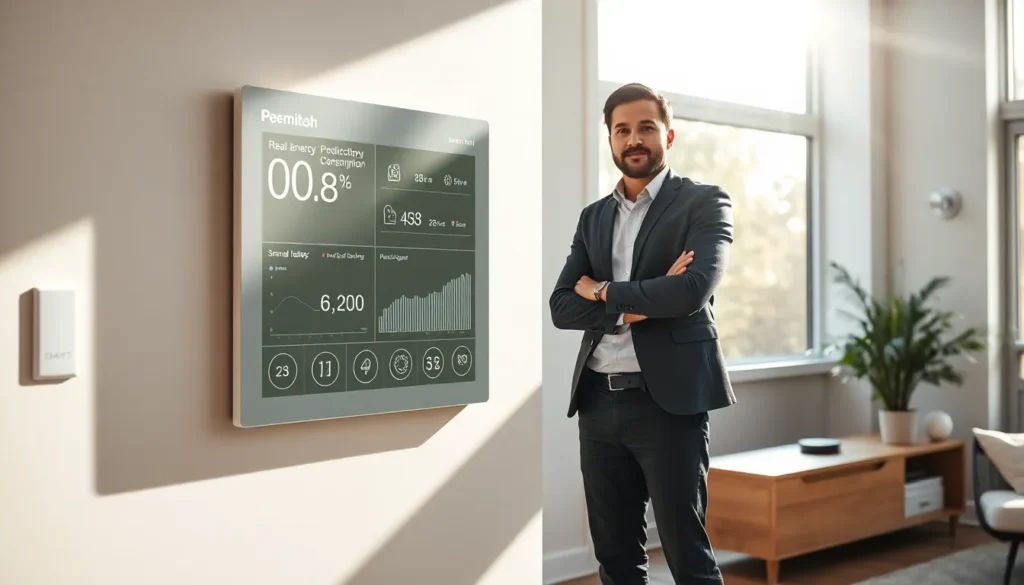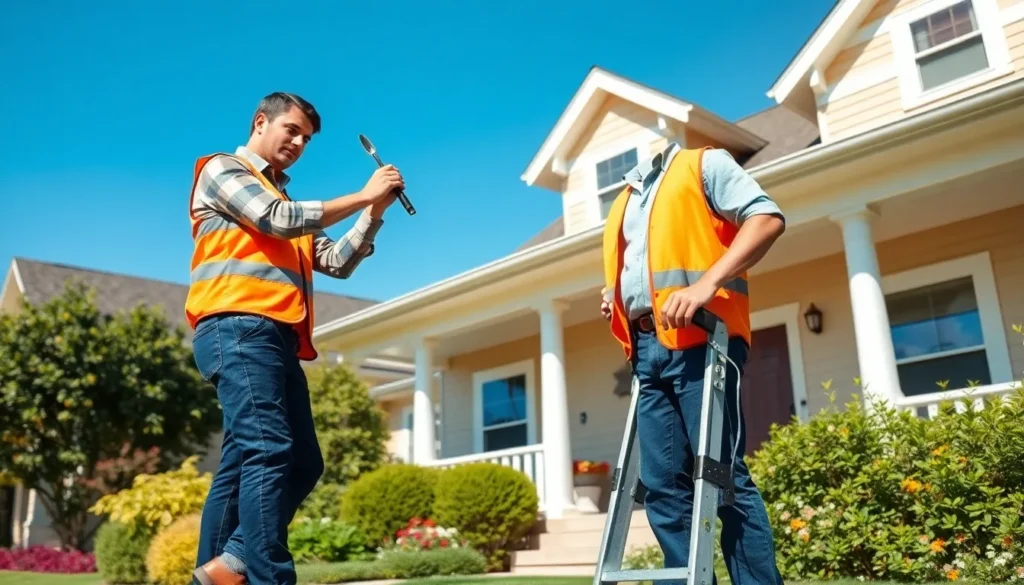Imagine walking into your home and having it greet you like an old friend. That’s the magic of smart home realty. With technology advancing faster than a cat chasing a laser pointer, homes are no longer just four walls and a roof. They’re becoming intelligent spaces that cater to your every whim, from adjusting the thermostat to brewing your morning coffee—all before you even step foot in the kitchen.
In this brave new world, smart home features aren’t just a luxury; they’re a necessity. Buyers are increasingly hunting for homes that offer more than just a cozy living room. They’re looking for properties equipped with the latest gadgets that promise convenience, security, and energy efficiency. So, if you’re ready to dive into the realm of smart homes, buckle up! The future of real estate is here, and it’s smarter than ever.
Table of Contents
ToggleOverview of Smart Home Realty
Smart home realty represents a significant shift in how people view properties. Technology integration transforms ordinary houses into connected living environments. Advanced features like automated lighting systems and smart locks enhance both convenience and security. Buyers now look for properties with these technologies as basic necessities.
Market trends indicate that homes equipped with smart features sell faster than traditional properties. In 2023, 38% of buyers prioritized smart technology when making purchasing decisions. Buyers find investment in smart technologies not just beneficial but essential for energy efficiency and overall comfort.
Real estate agents are adjusting their strategies to highlight smart home amenities. Agents present data showing lower energy costs tied to smart thermostats and automated systems. Showcasing these advantages creates a competitive edge in listings. Properties that emphasize connectivity, security, and efficiency attract more attention.
With the rise of smart home realty, homeowners embrace increased control over their living environments. Integration of various devices allows users to manage everything from appliances to security systems in one place. Overall, the evolution toward smart home features reflects contemporary lifestyles that prioritize innovation and convenience.
As technology advances, the future of real estate continues to shift. Expect smart home features to play a more significant role in property valuation and buyer preferences. The incorporation of these innovations into real estate signifies a move toward sustainable living solutions and enhanced quality of life.
Benefits of Smart Home Realty
Smart home realty offers numerous advantages that cater to modern living expectations. Buyers increasingly recognize these benefits, enhancing their home-buying experience.
Increased Convenience
Smart technology simplifies daily routines significantly. Control over various household devices occurs through smartphones or voice commands. Smart appliances such as refrigerators and ovens streamline meal prep, while automated lighting adjusts based on occupancy. Tasks like setting the thermostat or locking doors become effortless. Data shows that 38% of buyers in 2023 prioritize smart technology in property choices, reflecting a strong demand for conveniences that elevate quality of life.
Enhanced Security
Incorporating smart technology strengthens home security measures. Features like smart locks and surveillance cameras provide real-time monitoring and alerts. Homeowners can manage access remotely, granting entry to visitors even when away. Security systems equipped with motion sensors proactively address potential threats. As a result, properties with these advanced security features attract attention, appealing to safety-minded buyers. Enhanced security benefits resonate with prospects, as 38% align their purchasing decisions with smart technology.
Key Features of Smart Home Realty
Smart home realty includes advanced features that enhance convenience, security, and efficiency. Buyers increasingly prioritize these technologies when searching for properties.
Home Automation Systems
Home automation systems allow seamless control of various devices within a residence. Users can manage lighting, heating, and security systems from their smartphones or through voice commands. This interconnectedness elevates daily living experiences by simplifying routine tasks. According to recent data, 38% of buyers in 2023 specifically looked for homes with these smart features. Enhanced convenience appeals to many prospective homeowners. Devices like smart thermostats adapt to personal preferences, contributing to a personalized environment.
Energy Management Solutions
Energy management solutions play a critical role in modern smart homes. These technologies monitor energy consumption and help reduce waste. Homeowners can track usage patterns and adjust settings for optimal performance. Implementing energy-efficient devices can lead to significant savings on utility bills. Enhanced energy management also attracts environmentally conscious buyers. Features like smart plugs and energy-efficient appliances contribute to sustainability goals. As these functionalities gain traction, they significantly impact property valuations, making homes with such systems more appealing on the market.
Popular Smart Home Technologies
Smart home technologies enhance convenience and security while increasing energy efficiency. Key innovations include smart thermostats and smart lighting systems, which appeal to today’s buyers focused on modern living.
Smart Thermostats
Smart thermostats optimize energy use and provide personalized climate control. They learn homeowners’ schedules, adjusting temperatures automatically to ensure comfort. Connectivity with smartphones enables remote management and monitoring, enhancing convenience. Statistics reveal that homes featuring smart thermostats sell 38% faster, emphasizing their market appeal. For eco-conscious buyers, these devices can reduce energy consumption and lower utility bills, aligning with sustainability goals.
Smart Lighting
Smart lighting systems offer enhanced control over home illumination. Users can manage lights through smartphones or voice commands, creating customizable settings for different moods or times of day. Energy-efficient bulbs integrated into these systems contribute to lower energy costs, making them attractive to buyers focused on sustainability. Recent trends indicate that property listings highlighting smart lighting receive increased interest due to their modernity and practicality. Through automation, homeowners can improve security by scheduling lights to mimic occupancy when they’re away.
Challenges in Smart Home Realty
Smart home realty faces several challenges that affect buyers, sellers, and agents. Understanding these issues is essential for navigating the market effectively.
Privacy Concerns
Privacy concerns arise as smart home devices collect and transmit data. Hackers can exploit weaknesses in connected systems, leading to unauthorized access. Over 30% of buyers express worries about data security, influencing their purchasing decisions. Protecting personal information is paramount, especially with devices that monitor daily routines and habits. As the market grows, ensuring robust data protection protocols becomes crucial for maintaining buyer trust.
Compatibility Issues
Compatibility issues often hinder the seamless integration of smart home devices. Homeowners face difficulties in connecting devices from different manufacturers, resulting in a disjointed experience. Statistically, 28% of buyers report frustration over compatibility problems. Device interoperability remains a significant concern, as various ecosystems may not work well together. Simplifying the selection process and offering comprehensive solutions can help alleviate these compatibility challenges in smart home realty.
The rise of smart home realty marks a significant shift in the real estate landscape. As technology becomes integral to modern living, buyers are prioritizing homes equipped with smart features that enhance convenience and security. This trend not only elevates the home-buying experience but also influences property values in today’s market.
With smart technologies simplifying daily routines and providing peace of mind, the demand for these innovations is likely to grow. Real estate professionals must adapt to this evolving environment by emphasizing the benefits of smart home features. As the future unfolds, embracing smart home realty will be essential for buyers and sellers alike, paving the way for a more connected and efficient way of living.









